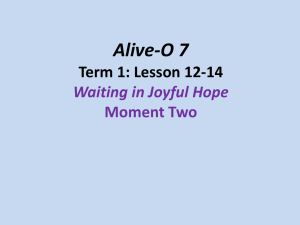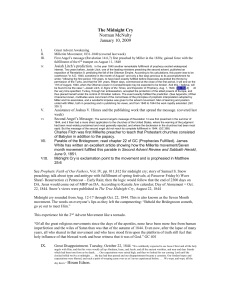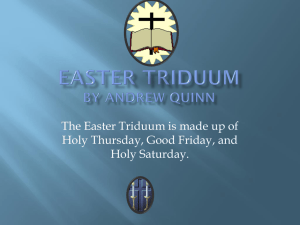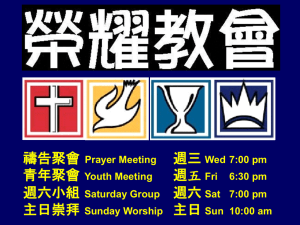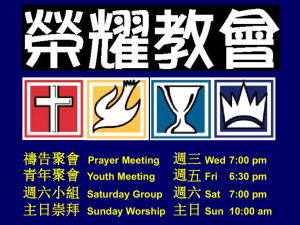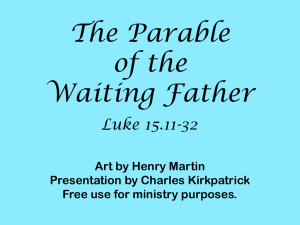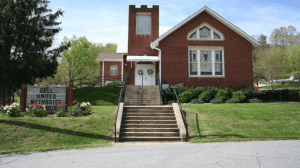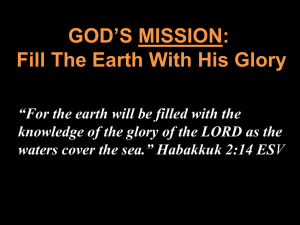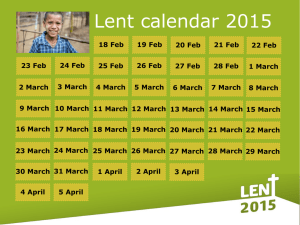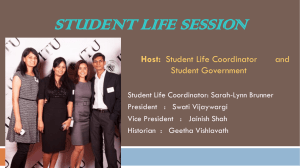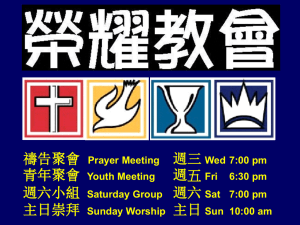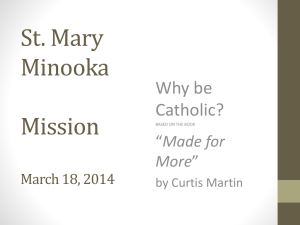The Midnight Cry
advertisement
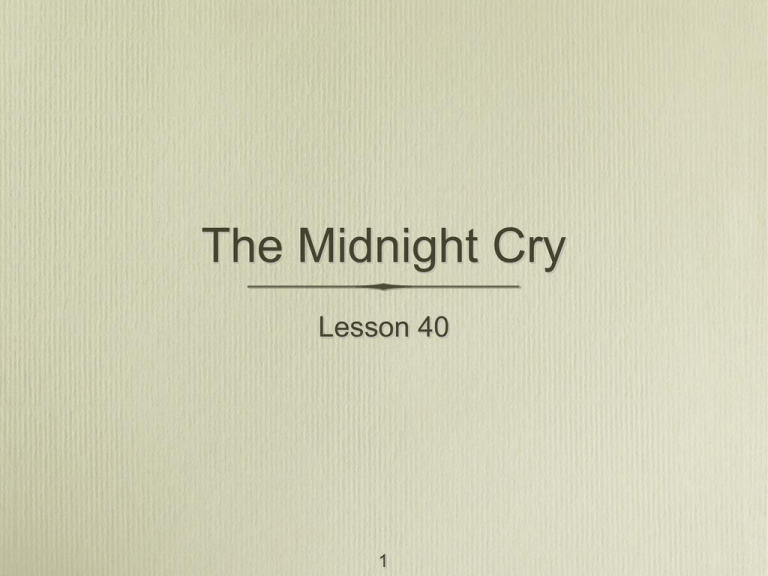
The Midnight Cry Lesson 40 1 On the Road with James White Winter 1843 Gardner Sidney Augusta Richmond Borden Bowdoinham Brunswick 2 At an advent camp meeting in Exeter, Maine, in 1842, James White heard clear and powerful preaching on Daniel 8:14, and he decided to leave his job of teaching school and become an advent preacher. 3 Like John Wesley, he went by horseback, and during one winter, he visited several towns in Maine. He was armed with an eye-catching chart, which he used in his preaching. Over 1,000 people were converted during a sixweek period due to his circuit-riding preaching. 4 But he was not always welcomed in the towns. At one time a mob hurled snowballs and other objects at him. 5 In the autumn of 1843 at Knox, Maine, the Eastern Christian Conference was held. James White had been preaching the advent message for a year, and he attended the conference. The conference was split on the Millerite doctrine, with the majority favoring it, but with the older and more sedate ministers doubting or rejecting it. 6 James’s supporters urged him to preach at the conference, but the ruling ministers gave him no opportunity. On the last day of the conference, James felt impressed by the Holy Spirit that he should proclaim the advent message, but an elderly, conservative minister was scheduled to preach. 7 What should he do? He went to a quiet place and prayed and then returned filled with the God’s Spirit. The church was crowded. As he entered the church and made his way toward the front, two of the men seated on the platform came down, took him by the arms, and guided him up onto the platform to sit with them, saying if he wanted to preach, he would have the chance. No one knew how he would get the chance because the service had already been planned and was about to begin. 8 James whispered to one of the two men, “If you will lead a hymn,” and to the other man, “if you will have the prayer,” and then to them both, “and if I can get a hold of the pulpit Bible, then I will preach.” 9 You see, the protocol was that whoever held the pulpit Bible, he was the one to preach. 10 So, the first brother sang, the second brother prayed, and during prayer, James White picked up the pulpit Bible! The prayer ended, the other men noticed the Bible in Brother James’s lap, but courtesy required that he be left with it, so they said nothing. Another Advent hymn was sung, and then James boldly stepped up to preach! 11 And he preached a powerful sermon. At the end, James and his two sisters sang one of the new Advent songs: 12 You will see the Lord a-coming You will see the Lord a-coming You will see the Lord a-coming In a few more days. When that heavenly, heavenly music, When that heavenly, heavenly music, When that heavenly, heavenly music, Will go sounding through the air. 13 And good, old Brother Clark, the very one who had led out in prayer, rose up each time the chorus was sung, shouting “Glory” and clapping his hands. 14 Everyone was, and still is, expecting Jesus to come! 15 Members of a religious organization called Heaven’s Gate believed that the coming of the comet Hale-Bopp in 1997 was the sign for which they had been waiting. A spaceship was coming in the trail of the comet to take them from this world to their heavenly home. They had been, as it were, in a classroom here on earth and now they were to graduate to heaven. They needed to shed their earthly bodies, or containers, as they called them, to board this spacecraft, so the thirty-nine members of the organization, from teenage to elderly, committed suicide in order to rendezvous with the spaceship. They were going to heaven and had been waiting twenty-two years for this trip! 16 In 2011 a group led by Harold Camping preached that Jesus was returning on May 21, 2011. 17 O’Dea at WikiCommons 18 Eli the Bearded 19 And, sadly, even among people today who used to believe in Seventh-day Adventism are those who set a recent date for the return of Jesus and who now have recalculated a new date. We do not need to be deceived, however, for the Bible says: 20 Watch therefore, for ye know neither the day nor the hour wherein the Son of man cometh (Matthew 25:13). 21 The Bible does not give us the date that Jesus will return, but we can know that the time is near, and while we wait, we are told to watch and pray. 22 And under inspiration, Ellen White wrote: This time which the angel declares with a solemn oath, is not the end of this world’s history, neither of probationary time, but of prophetic time, which should precede the advent of our Lord. That is, the people will not have another message upon definite time. After this period of time, reaching from 1842 to 1844, there can be no definite tracing of the prophetic time. The longest reckoning reaches to the autumn of 1844. (Manuscript Releases, vol. 1, p. 100) 23 But in the summer of 1844, God’s people were confused. At first they had expected Jesus to come in 1843, then in the spring of 1844, and now it was summer, and Jesus had not come. 24 Samuel S. Snow In 1843 he left his family and began proclaiming the Advent message full time, without wages. 25 William Miller studied Daniel and Revelation and wrote a book in 1833 entitled Evidences from Scripture and History of the Second Coming of Christ about the year A.D. 1843, and of His Personal Reign of 1000 Years 26 “I stand before you as a monument of the grace of God, a living proof of his truths. . . . A few years ago I was a callous and hardened Infidel, and was so for years . . . Falling in with unbelievers in the Bible and various skeptics, I became impregnated with their false doctrines, and, up to my 35th year, I was a settled unbeliever in the Bible. . . . From 1833 to 1839, I was a constant patron of the Boston Investigator, the organ of the Infidels. . . . I took an active part in this cause, and was for several years an agent for the Investigator . . . and a contributor to its columns.” 27 “I remained a skeptic till 1839, and then, through the power of God, who ordered my steps to be turned into the right way, a book written by Mr. Miller fell into my hands, which advocated the coming of Christ. . . . I had often heard of Mr. Miller and his views, and supposed them to be all moonshine. . . . I took the book home and read it, and the more I read it the more was I impressed with its truth. . . . I saw the perfect harmony between Daniel and the Revelation, . . . that the Bible, which I had so long rejected, was the word of God, . . . [and] that I had been rebelling against [God]. . . . I prayed to God in secret, I prayed in my family, and I went forward in the discharge of that duty that belongs to Christians.” (Samuel Snow; quoted in Lest We Forget, 2nd Quarter, 1993, p. 4.) 28 “I believe that as certain as the Bible is God’s truth, that just so certain the next event will be the coming of the Lord Jesus Christ.” (Ibid.) After closely studying the prophetic calculations, Mr. Snow became convinced they were in error. The true end of time was the autumn of 1844. 29 In the parable of Matthew 25 the time of waiting and slumber is followed by the coming of the bridegroom. . . . and the “midnight cry” was heralded by thousands of believers.(The Great Controversy, p. 400) 30 And at midnight there was a cry made, Behold, the bridegroom cometh; go ye out to meet him. (Matthew 25:6) 31 Like a tidal wave the movement swept over the land. From city to city, from village to village, and into remote country places it went, until the waiting people of God were fully aroused. Fanaticism disappeared before this proclamation like early frost before the rising sun. Believers saw their doubt and perplexity removed, and hope and courage animated their hearts. (The Great Controversy, p. 400) 32 triplej 33 Ian Chan 34 There was little ecstatic joy, but rather deep searching of heart, confession of sin, and forsaking of the world. A preparation to meet the Lord was the burden of agonizing spirits. There was persevering prayer and unreserved consecration to God. (Ibid., pp. 400, 401) 35 Of all the great religious movements since the days of the apostles, none have been more free from human imperfection and the wiles of Satan than was that of the autumn of 1844. Even now, after the lapse of many years, all who shared in that movement and who have stood firm upon the platform of truth still feel the holy influence of that blessed work and bear witness that it was of God. (Ibid., p. 401) 36 Joseph Bates attended the same Advent camp meeting in New Hampshire that Samuel Snow attended, and Bates wrote of it in his autobiography. He also wrote of a “tarry” time which we read about in Habakkuk 2:3: 37 For the vision is yet for an appointed time, but at the end it shall speak, and not lie: though it tarry, wait for it; because it will surely come, it will not tarry. 38 “Soon after the tarry of the vision of 2300 days, the second angel’s message began to be proclaimed. While moving on in this message into the summer of 1844, the definite time for the close of the vision began to be taught. But the leading ministers opposed. A camp-meeting was appointed to convene in Exeter, N. H., on the 12th of August. On my way there in the cars, something like the following was several times very forcibly presented to my mind: ‘You are going to have new light here! something that will give a new impetus to the work. 39 “On my arrival there, I passed around among the many tents to learn if there was any new light. I was asked if I was going to the Exeter tent, and was told that they had new light there. I was soon seated among them, listening to what they called ‘the midnight cry.’ This was new light, sure enough. 40 “It worked like leaven throughout the whole camp. And when that meeting closed, the granite hills of New Hampshire were ringing with the mighty cry, ‘Behold the bridegroom cometh; go ye out to meet him.’ As the loaded wagons, stages, and railroad cars, rolled away through the different States, cities and villages of New England, the cry was still resounding, ‘Behold the bridegroom cometh!’ Christ, our blessed Lord, is coming on the tenth day of the seventh month! Get ready! get ready!!” (The Autobiography of Elder Joseph Bates, p. 297) 41 Samuel S. Snow • Rejected the message Hiram Edson had received that the date was correct but the event was that Jesus had entered the most holy place. • He continued to search for a date of the second coming--October 22, 1845, 1846, 1847 • Adopted the “shut door” theory that the date was correct but the event was that Jesus had come spiritually, had shut the door to his house, and only those who entered on the 22nd of October 1844 were saved. 42 FYI: The shut door that Ellen White accepted was the door to the holy place: “I saw that Jesus had shut the door of the holy place, and no man can open it; and that He had opened the door into the most holy, and no man can shut it . . . The enemies of the present truth have been trying to open the door of the holy place, that Jesus has shut, and to close the door of the most holy place, which He opened in 1844 . . .” 43 Samuel S. Snow (continued) • Established a new group in 1845 called the Mount Zion Church • Thought himself to be as Elijah, the prophet, preparing the way for the return of Christ • Refused to accept the emerging Seventh-day Adventist Church, the seventh day Sabbath, the sleeping state of the dead, or the prophetic gift of Ellen White 44 It was not long after the passing of the time, in 1844, that my first vision was given me. I was visiting Mrs. Haines at Portland, a dear sister in Christ, whose heart was knit with mine; five of us, all women, were kneeling quietly at the family altar. While we were praying, the power of God came upon me as I had never felt it before. (Christian Experience and Teachings of Ellen G. White, p. 57) 45 I seemed to be surrounded with light, and to be rising higher and higher from the earth. I turned to look for the advent people in the world, but could not find them, when a voice said to me, “Look again, and look a little higher.” At this, I raised my eyes, and saw a straight and narrow path, cast up high above the world. On this path the advent people were traveling to the city which was at the farther end of the path. They had a bright light set up behind them at the beginning of the path, which an angel told me was the “midnight cry.” (Ibid.) 46 This light shone all along the path, and gave light for their feet, so that they might not stumble. (Ibid.) 47 If they kept their eyes fixed on Jesus, who was just before them, leading them to the city, they were safe. But soon some grew weary, and said the city was a great way off, and they expected to have entered it before. Then Jesus would encourage them by raising His glorious right arm, and from His arm came a light which waved over the advent band, and they shouted “Alleluia!” (Ibid.) 48 Others rashly denied the light behind them, and said that it was not God that had led them out so far. The light behind them went out, leaving their feet in perfect darkness, and theystumbled and lost sight of the mark and of Jesus, and fell off the path down into the dark and wicked world below. (Ibid.) 49 Remember Joshua Himes? He published the Millennial Harp, 300 pages of newly-written Advent hymns, some of which we continue to sing today, hymns such as 50 You will see the Lord a-coming You will see the Lord a-coming You will see the Lord a-coming In a few more days. When that heavenly, heavenly music, When that heavenly, heavenly music, When that heavenly, heavenly music, Will go sounding through the air. 51 Another early Advent hymn sung is the Isaac Watts hymn, “Lo, What a Glorious Sight Appears,” #446 in the new SDA hymnal: 52 Lo, what a glorious sight appears To our believing eyes; The earth and seas are passed away, And the old rolling skies. And the old rolling skies! And the old rolling skies! The earth and seas are passed away And the old rolling skies! 53 Chorus: O that will be joyful, joyful, joyful, O that will be joyful When we meet to part no more, When we meet to part no more On Canaan’s happy shore. Tis there we’ll meet, at Jesus’ feet, When we meet to part no more. 54 Three Angels’ Messages • First message was given by William Miller, starting in 1831 (Spirit of Prophecy, vol. 4, p. 207) • Second message was first preached in the summer of 1844 (The Great Controversy, p. 389) • Third message was preached starting October 23, 1844 (Early Writings, p. 254) 55 I saw that this message will close with power and strength far exceeding the midnight cry. Servants of God, endowed with power from on high with their faces lighted up, and shining with holy consecration, went forth to proclaim the message from heaven. (Early Writings, pp. 278, 279) 56
